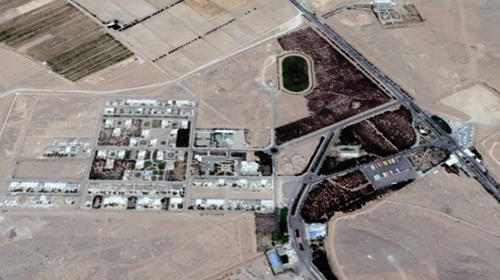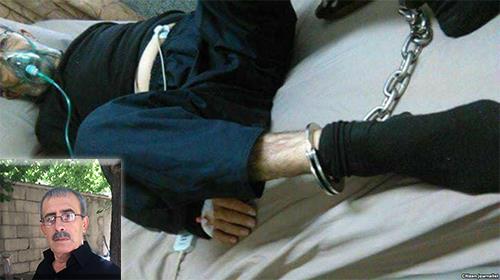NUKES OF HAZARD? Iran’s ‘secret military nuclear programme revealed in satellite pictures’ as regime threatens to ‘crush’ Donald Trump
The Hafte Tir military Complex near Isfahan. The NCRI claims the remote site is used to develop nukes
The NCRI claims Iran has been preparing itself to obtain a nuclear weapon
IRAN is hiding the true power of its nuclear weapons programme in secret bases hidden from inspectors, a new report has claimed
The Sun, 10th October 2017 - The document contains images that claim to show satellite photos of installations at the heart of the Islamic Republic's alleged pursuit of weapons of mass destruction.
It was complied by the US-based National Council of Resistance of Iran (NCRI) using sources in the People’s Mojahedin Organisation of Iran (PMOI) based within Iran.
The resistance group claims Tehran has 'worked systematically on the various stages of enrichment, weaponisation, warheads, and delivery systems.
Chillingly, it adds: 'In other words, Iran has been preparing itself to obtain a nuclear weapon.'
The NCRI says there are four sites that are key to the weapons programme and are hidden from nuclear inspectors - Pazhouheshkadeh, Nouri, Hafte Tir and Sanjarian.

Parchin is a large military district about 30 miles southeast of Tehran. It contains 12 military and missile complexes, it is claimed

The Iranian oposition group claims an industrial group called Nouri helps the regime build missiles at Khojir
The report states that the regime has concealed its true intentions by 'deception, concealment, lying, destroying and tampering with evidence'.
It adds: 'Some entities at the highest levels of the Iranian regime, including offices and centres affiliated with the President’s office, have been involved in smuggling or skirting sanctions to obtain illicit or dual-purpose equipment for these projects.'

This Defence Ministry site is allegedly codenamed 'Research Academy' and is used to conduct research into trigger mechanisms

The project to produce nukes is conducted in Khojir (pictured) by the Hemmat Missile Industries Group, the US-based group claims
The report's authors said: 'Specific intelligence relating to the above four facilities and two headquarters confirms that a significant portion of the various aspects of Iran’s nuclear project have been conceived and developed over the past decades in its military centres.'
Last month Nikki Haley, United States Ambassador to the United Nations, said: 'The biggest concern is that Iranian leaders — the same ones who in the past were caught operating a covert nuclear programme at military sites — have stated publicly that they will refuse to allow IAEA (International Atomic Energy Agency) inspections of their military sites.'
President Donald Trump has taken a hard stance against Iran and has accused his predecessor Barack Obama of being too soft on Tehran.
Iran lashed out at the US today, threatening to teach the Americans 'new lessons' and keep 'all options on the table' if Washington blacklists its Revolutionary Guards.

An Iranian Zelzal medium range missile passes by Iranian regime's President Hassan Rouhani

A still image from Iranian TV shows a Khoramshahr missile being launched from an undisclosed location

Iran says it has successfully tested a new medium-range missile as earthquake detected in North Korea
Trump is likely to include 'decertify' a landmark 2015 deal that lifted international sanctions in return for curbs on Tehran's nuclear programme.
Such a step would stop short of pulling out of the agreement, leaving that decision to US Congress.
Trump is also expected to designate Iran's most powerful security force, the Islamic Revolutionary Guards Corps (IRGC), as a terrorist organisation.
WHAT IS THE IRANIAN NUKE DEAL?
The Iranian nuclear deal, backed by European countries, China and Russia, lifted broad international sanctions over Iran's nuclear programme that had been tightened during the Obama years and had caused severe damage to Iran's economy.
But Washington still maintains separate unilateral sanctions over Tehran's missile programme and over allegations it supports terrorism.
The lingering U.S. sanctions have slowed Iran's re-emergence into the world economy, making global banks reluctant to take on business with Iranian firms despite the nuclear deal.
The United States already blacklists some individuals and entities for supporting IRGC activities, but not the Guards themselves.
Designating the Guards as terrorists could make it more difficult for Iranian businesses to take advantage of the lifting of the international sanctions, since banks are required to verify that their clients are not on terrorism blacklists.
Iran says the nuclear deal does not require it to restrict its missile programme.
Zarif, the Iranian foreign minister, said Iran purposefully excluded military capabilities from the pact, as 'it is not intended as leverage or a bargaining chip in future negotiations'.
In an article published in the Atlantic on Monday, Zarif added: 'No party or country need fear our missiles unless it intends to attack our territory.'




Comments
Post a Comment